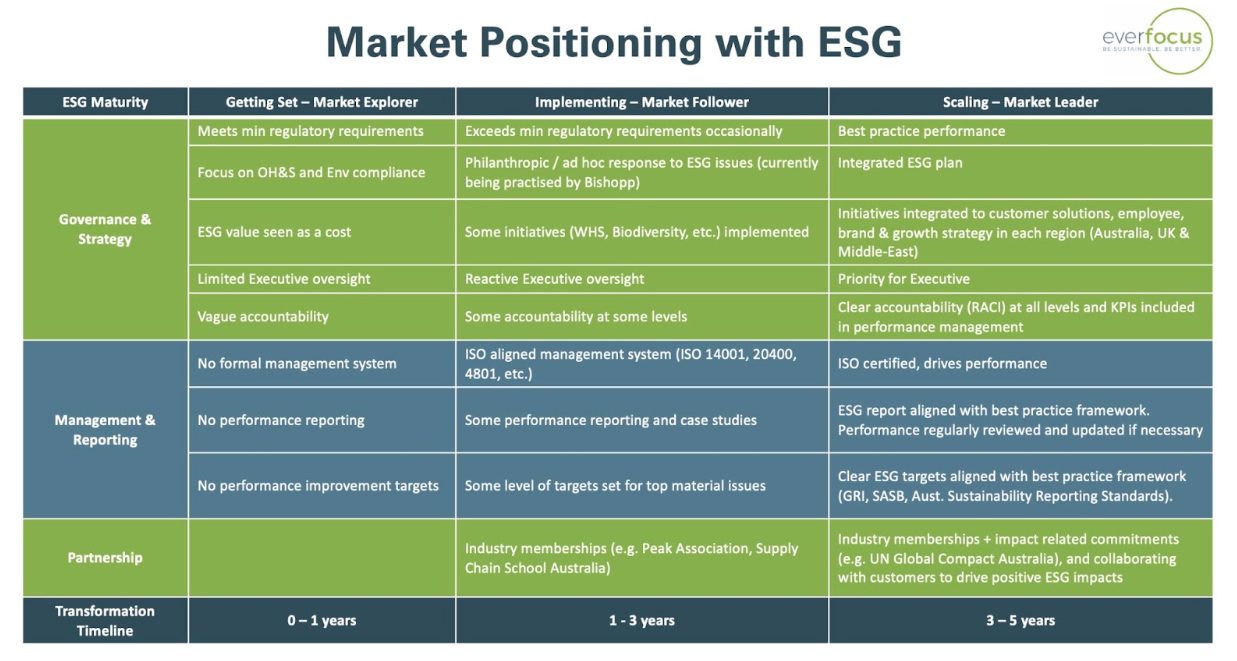At board level, ESG naturally sits within the broader context of governance, risk, and long-term strategy. Executive leaders may be responsible for driving operational aspects and presenting recommendations, but it is the board that weighs those proposals against organisational priorities and risk appetite.
In our experience, boards that treat ESG as a strategic priority are better placed to strengthen resilience and sharpen their competitive edge. By staying curious and seeking the right insights, directors can ensure ESG moves beyond an operational measure and becomes a genuine driver of value.
Here are seven questions board members can ask to cut through the noise and sharpen ESG oversight:
1. What are our top three ESG risks and opportunities, and what is our plan to address them?
It’s never possible to solve every problem simultaneously, especially with ESG, but boards and the teams reporting to them should be able to articulate the biggest risks and opportunities, and back them up with relevant data and stakeholder insights.
Once there is an understanding of how existing policies are being managed, where the trouble spots lie and where easy wins can be achieved, it will be easier to allocate priorities. Importantly, these reviews often surface areas of ESG strength as well, and boards should consider how those strengths will be sustained as efforts focus on closing the gaps.
2. How does our ESG strategy compare with sector peers and global best practice?
Knowing where your organisation sits on the ESG maturity curve requires more than internal KPIs.
Boards should seek comparative benchmarking and look to review industry norms, international frameworks and emerging standards. This approach will highlight gaps, keep ambition realistic and support credible leadership claims.

3. What gaps exist in our ESG reporting, and how are they being closed?
Your organisation needs to have an ESG strategy, apply it and be able to explain its effectiveness.
These questions will help with the reporting side of things:
- Which disclosures are voluntary vs mandated?
- Can third-party verification be used (or not)?
- Are our data collection methods consistent and auditable?
Missing information can reflect wider system or governance issues, and point to where an ESG strategy is not being actively implemented.
4. When did we last update or review our ESG strategies?
ESG is a fast-moving field, and what was considered progressive three years ago may now be seen as basic compliance.
Strategic plans should be reviewed at least annually and boards kept up to date with how ESG requirements align with changing regulations, stakeholder expectations and operational realities.
5. How do we measure and report on the impact of our ESG strategy?
There’s a difference between tracking activity and measuring impact.
Boards should ask whether the organisation can demonstrate a clear link between ESG initiatives and real-world outcomes. This includes both quantitative and qualitative evidence, and should go beyond single headline issues like carbon emissions to all material ESG issues the business faces.
6. How do we make sure our disclosures are meaningful and our claims are free from greenwashing?
Scrutiny is increasing from regulators, the media and the community. Because of this, vague or overly optimistic claims such as ‘planet-friendly’ can backfire and even lead to financial penalties.
This is where data comes in; it provides concrete rather than anecdotal evidence, so boards can confidently back disclosures or claims made about ESG.
7. Are we prepared for incoming ESG-related government policy changes, including mandatory climate risk reporting?
Australia recently finalised its sustainability reporting legislation and standards, and mandatory internationally-aligned climate-related financial disclosures for certain entities are now in force.
Legislation mandates relevant entities to disclose climate-related plans, financial risks and opportunities, in accordance with Australian Sustainability Reporting Standards (ASRS). While new rules will not apply to every business, boards need clarity on how prepared the organisation is to meet the standards imposed by law, or how it can prepare to meet them in the future.
ESG Performance Categories to review
The questions above should be asked with the following in mind:
https://esgmastery.everfocus.com.au
Environmental Data
- Greenhouse Gas (GHG) Emissions
- Energy usage and efficiency
- Water usage and security
- Waste management and recycling
- Product lifecycle & circular economy
- Biodiversity & ecology
Social Data
- Workplace Health and Safety
- Diversity, Equity, and Inclusion (DEI)
- Modern Slavery & labor standards
- Community engagement
- Training & education
Governance Data
- Board structure and independence
- ESG Risk management effectiveness
- Regulatory compliance & public disclosures
- Anti-bribery and corruption measures
Use this ESG Scorecard to assess your performance
ESG is dynamic, not static
The best ESG outcomes result from boards that treat ESG as a dynamic component of strategy, rather than a compliance task. This starts with asking sharper questions, pushing for clear answers, and making ESG performance part of everyday decision-making.
Everfocus works with Australian organisations to embed ESG into boardroom conversations, align strategy with sustainability goals and build systems to support confident, credible reporting. If your corporate ESG data isn’t telling the full story, we can help uncover what matters most and determine the next steps.
